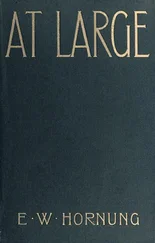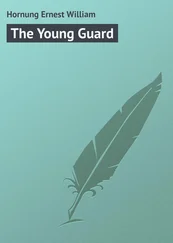Ernest Hornung - At Large
Здесь есть возможность читать онлайн «Ernest Hornung - At Large» — ознакомительный отрывок электронной книги совершенно бесплатно, а после прочтения отрывка купить полную версию. В некоторых случаях можно слушать аудио, скачать через торрент в формате fb2 и присутствует краткое содержание. Жанр: foreign_prose, Зарубежные любовные романы, на английском языке. Описание произведения, (предисловие) а так же отзывы посетителей доступны на портале библиотеки ЛибКат.
- Название:At Large
- Автор:
- Жанр:
- Год:неизвестен
- ISBN:нет данных
- Рейтинг книги:3 / 5. Голосов: 1
-
Избранное:Добавить в избранное
- Отзывы:
-
Ваша оценка:
- 60
- 1
- 2
- 3
- 4
- 5
At Large: краткое содержание, описание и аннотация
Предлагаем к чтению аннотацию, описание, краткое содержание или предисловие (зависит от того, что написал сам автор книги «At Large»). Если вы не нашли необходимую информацию о книге — напишите в комментариях, мы постараемся отыскать её.
At Large — читать онлайн ознакомительный отрывок
Ниже представлен текст книги, разбитый по страницам. Система сохранения места последней прочитанной страницы, позволяет с удобством читать онлайн бесплатно книгу «At Large», без необходимости каждый раз заново искать на чём Вы остановились. Поставьте закладку, и сможете в любой момент перейти на страницу, на которой закончили чтение.
Интервал:
Закладка:
In short, Mr. Miles exhibited to the Bristos, on several occasions, a propensity to odd and impulsive generosity; and the point told considerably in their general regard for the man, which day by day grew more profound.
Among other peculiarities, so excellently appreciated, Mr. Miles had a singular manner of speaking. It was an eminently calm manner; but for the ring of quiet audacity in every tone, it might have been called a subdued manner. He never raised his voice; he never spoke with heat. When he said to Colonel Bristo, clinging to him in the sea, "If you hang on like that I must fell you," his tone was as smooth as when he afterwards apologised for the threat. When he paid Alice his first compliment he did so without the smallest hesitation, and in his ordinary tone; and his compliments were of the most direct order. They once heard him threaten to thrash a bargee for ill-treating a horse, and they were amazed when the man sulkily desisted; the threat was so gently and dispassionately uttered. As for his adventures, they were told with so much of detail and gravity that the manner carried conviction where the matter was most fantastic. Miles was the best of "good company." Apart from the supreme service rendered to him, Colonel Bristo was fully persuaded that he was entertaining the best fellow in the world. Add to this that Mrs. Parish adored the handsome Australian, while Alice meekly revered him, and it will be easily seen that a hostile opinion of their hero was well calculated to recoil on its advocate.
During the short period in which the hero was also the stranger, he spent all his time in the Colonel's society. Apparently the two men found many subjects of mutual interest. Once, when Alice interrupted them in the study, Mr. Miles seemed to be eloquently enumerating the resources and capabilities of some remote district of the Antipodes; for though she spent some minutes getting a book, he took no notice of her presence in the room. On another occasion Alice saw her father examining a kind of map or plan, while Mr. Miles bent over him in explanation. She afterwards learnt that this was a plan of the Queensland station of which Mr. Miles was part owner.
After the first day or two it seemed evident that Mr. Miles disliked the society of ladies.
On the third evening, however, the men patronised the drawing-room for half-an-hour, and the Colonel asked Alice to sing something. She sang, and Mr. Miles listened. When she had finished, Mr. Miles coolly asked her to sing again. The following night he extracted three songs from her. Then Mr. Miles began to spend less time in his host's sanctum. He cultivated Alice; he interested himself in her amusements – photography for one; he got her to sing to him in the daytime. He was civil to Mrs. Parish.
When the young lady sat down to the piano, this sun-burned Apollo did not hang over her, as other men did (when they got the chance); nor did he turn over a bar too soon or too late – like the others. He made no pretence of polite assistance, not he. But he flung himself in a chair, threw back his head, and drank in every note. At first it was generally with his back to the piano, and always with closed eyes. Then he found another chair – one a little further away, but so placed that the girl's profile was stamped like a silhouette on the sunlit window, directly in his line of vision. And he no longer listened with closed eyelids.
Mrs. Parish, a keen observer, hovered about during these performances, and noted these things. She had perceived at the time the impression Alice's first song made upon Mr. Miles: she saw that he had regarded the girl from that moment with a newly awakened interest. Thenceforth he had made himself agreeable to both ladies, whereas before he had ignored them both. Now, although she knew well enough that Miles's attentions, so far as she was concerned, could be but politic, yet such was the inveterate vanity of this elderly duenna that she derived therefrom no small personal gratification. An impudent compliment thrilled her as it might have thrilled a schoolgirl. But this did not prevent her seeing what was really going on, nor secretly rejoicing at what she saw.
She watched the pair together from the first. She watched the girl innocently betray her veneration for the man who had saved her father's life. She knew that it is perilous for a man to see that a girl thinks him a hero, and she awaited results. She soon fancied that she saw some. She thought that Miles's habitual insouciance was a trifle less apparent when he conversed with Alice; certainly his eyes began to follow her and rest upon her; for Mr. Miles did such things openly. But she detected no corresponding symptoms in Alice; so one day she told her bluntly: "Mr. Miles is falling in love with you, child."
Alice was startled, and coloured with simple annoyance.
"What nonsense!" she said indignantly.
Immediately she thought of the absent Dick, and her blush deepened – because she thought of him so seldom. Mrs. Parish replied that it was not nonsense, but, instead of urging proofs in support of her statement, contented herself with cataloguing Mr. Miles's kingly attributes. Here Alice could not contradict her. The old lady even spoke of the station in Queensland and the house at Sydney. Encouraged by the girl's silence, however, she overshot the mark with a parallel reference – and not a kind one – to Dick Edmonstone. She saw her mistake at once, but too late; without a word Alice turned coldly from her, and they barely exchanged civilities during the rest of that day.
From that moment Miss Bristo's manner towards Mr. Miles was changed. Mrs. Parish had put into her head a thought that had never once occurred to her. An innocent pleasure was poisoned for her. She did not quite give up the songs, and the rest, but she became self-conscious, and developed a sudden preference for that society which is said to be no company at all.
At this juncture the ship Hesper entered the Channel, and was duly reported in the newspapers. Alice saw the announcement, and knew that in two or three days she should see her lover. These days she spent in thought.
At seventeen she had been madly in love with young Edmonstone – what is called a "romantic" or "school-girl" affair – chiefly sentimental on her side, terribly earnest on his. At eighteen – parted many months from a sweetheart from whom she never heard, and beginning to think of him daily instead of hourly – she asked herself whether this was really love. At nineteen, it was possible to get through a day – days, even – without devoting sentimental minutes to the absent one. Alice was at least madly in love no longer. There remained a very real regard for Dick, a constant prayer for his welfare, a doubt as to whether he would ever come home again, a wondering (if he did) whether she could ever be the same to him again, or he to her; nothing more.
Mrs. Parish was in a great measure responsible for all this. That excellent woman had predicted from the first that Dick would never make his fortune (it was not done nowadays), and that he would never come back. Another factor was the ripening of her understanding, aided by a modicum of worldly experience which came to her at first-hand. Alice was honoured with two proposals of marriage, and in each case the rejected (both were wife-hunting) consoled himself elsewhere within three months. To this groundwork Mrs. Parish added some judicious facts from her own experience; and this old lady happened to be the girl's only confidante and adviser. Alice gathered that, though man's honour might be a steadfast rock, his love was but a shifting sand. Thus there were such things as men marrying where they had ceased to love; thus Dick might return and profess love for her which was no longer sincere.
In the end Miss Bristo was left, like many other young ladies, with an imperfect knowledge of her own mind, and attempted, unlike most young ladies, to mould her doubts into a definite and logical form. She did arrive at a conclusion – when she learned that Dick was nearly home. This conclusion was, that, whatever happened, there must be no immediate engagement: she did not know whether Dick loved her still – she was not absolutely sure that she still loved him.
Читать дальшеИнтервал:
Закладка:
Похожие книги на «At Large»
Представляем Вашему вниманию похожие книги на «At Large» списком для выбора. Мы отобрали схожую по названию и смыслу литературу в надежде предоставить читателям больше вариантов отыскать новые, интересные, ещё непрочитанные произведения.
Обсуждение, отзывы о книге «At Large» и просто собственные мнения читателей. Оставьте ваши комментарии, напишите, что Вы думаете о произведении, его смысле или главных героях. Укажите что конкретно понравилось, а что нет, и почему Вы так считаете.












